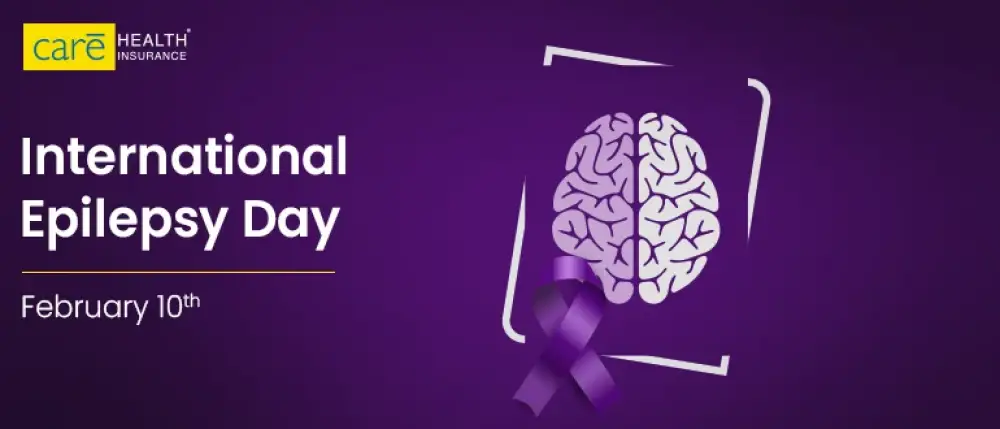Subscribe to get weekly insights
Always stay up to date with our newest articles sent direct to your inbox
Published on 7 Feb, 2025
Updated on 24 Feb, 2025
1028 Views
3 min Read

Written by Farina Khan
Reviewed by Munmi Sharma
favorite0Like
favoriteBe the First to Like
World Epilepsy Day is dedicated to shedding light on the realities of epilepsy. Each year, World Epilepsy Day is observed on the second Monday of February. In 2025, the International Epilepsy Day will be celebrated on 10 February 2025. With the joint efforts of the International Bureau for Epilepsy (IBE) & International League Against Epilepsy (ILAE), this day is observed worldwide. Medical and healthcare professionals, various organizations, and individuals come together to raise awareness, break stigmas, and celebrate the strength of those living with epilepsy.
International Epilepsy Day is an initiative by the World Health Organization (WHO) under the 10-year Intersectoral Global Action Plan on Epilepsy and other Neurological Disorders, also known as IGAP. Here is an overview of International Epilepsy Day 2025:
| Observed On | Second Monday of February |
| Date | 10th Feb 2025 |
| Objective | Raise awareness, promote research, advocate for rights, support and empower |
| Organizers | International Bureau for Epilepsy (IBE), International League Against Epilepsy (ILAE) |
| Theme 2025 | Specific focus (e.g., improving access to treatment, supporting caregivers) |
| Key Activities | Educational events, awareness campaigns, advocacy efforts, personal stories |
| Participation | Global community including individuals, organizations, advocates |
| Awareness Color | Purple |
| Social Media Hashtags | #EpilepsyDay,#EpilepsyAwarenessDay |
| Global Impact | Affects approximately 50 million people worldwide. |
| Related Initiatives | Part of WHO’s 10-year Global Action Plan on Epilepsy and Neurological Disorders (2022-2031) to improve service coverage and protect human rights. |
International Epilepsy Day is spearheaded by the International Bureau for Epilepsy (IBE) and the International League Against Epilepsy (ILAE). It aims to:
Whether you have epilepsy, know someone who does, or simply want to make a difference, there are numerous ways to get involved in International Epilepsy Day:
Epilepsy is a neurological disorder characterized by recurrent, unprovoked seizures. These seizures are the result of abnormal electrical activity in the brain and can vary widely in terms of their frequency, intensity, and type. While there can be different types of epilepsy that can affect anyone. Epilepsy attack is more common in childhood or in older adults. It can be caused by genetic factors, brain injury, infections, or unknown reasons. However, it can be treated with various kinds of epilepsy medications.
International Epilepsy Day is more than just a day on the calendar it is a powerful reminder of our collective responsibility to support and uplift those affected by epilepsy. By raising awareness, promoting research, advocating for rights, and celebrating resilience, we can make a meaningful impact in the lives of millions of people worldwide. Together, we can create a world where epilepsy is understood and accepted and no longer a barrier to living a full and vibrant life.
Additionally, ensure yourself with a comprehensive health insurance plan by Care Health Insurance that provides immediate coverage in case of a medical emergency. An ideal insurance policy can ensure that policy holders are mentally relaxed and financially protected in case of unforeseen mishaps.
>> Also Read: What is the Main Cause of Epilepsy?
Disclaimer: The above information is for reference purposes only. Kindly consult your general physician for verified medical advice. The health insurance benefits are subject to policy terms and conditions. Refer to your policy documents for more information.
favoriteBe the First to Like
Thyroid : मामूली नहीं हैं महिलाओं में थायराइड होना, जानें इसके लक्षण और घरेलू उपचार Vipul Tiwary in Diseases
शुगर कंट्रोल कैसे करे? जानें, डायबिटीज में क्या खाना चाहिए Vipul Tiwary in Health & Wellness
हाई ब्लड प्रेशर को तुरंत कंट्रोल कैसे करें? देखें इसके उपाय Vipul Tiwary in Diseases
पैरों में दर्द किस कमी से होता है? जानें, इसके घरेलू इलाज Vipul Tiwary in Health Insurance Articles
National Newborn Care Week: Every Touch, Everytime, Every Baby! Mudit Handa in Awareness Days
Pancreatic Cancer Awareness Month: Shine a Light for Early Detection! Mudit Handa in Awareness Days
Lung Cancer Awareness Month: Breaking Barriers to Champion the Cause Mudit Handa in Awareness Days
World Immunization Day: Attaining Physical and Financial Immunity Mudit Handa in Awareness Days
International Epilepsy Day 2025 will fall on February 10, 2025 (Second Monday of February).
Types of epilepsy can be classified into focal seizures (originating in one part of the brain) and generalized seizures (affecting both sides of the brain other types include absence seizures, tonic-clonic seizures, and myoclonic seizures.
While some types of epilepsy can have a genetic component, it is not always hereditary. Various factors, including brain injuries and infections, can contribute to epilepsy.
Diagnosis typically involves a combination of medical history, neurological examination, and tests such as electroencephalogram (EEG) and brain imaging (MRI or CT scan).
Currently, there is no cure for epilepsy, but it can often be managed effectively with treatment. Many people with epilepsy can achieve good seizure control.
Always stay up to date with our newest articles sent direct to your inbox
Loading...